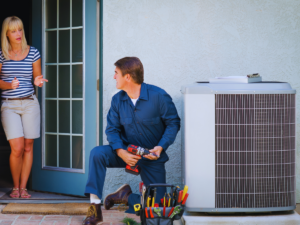 Sweltering in 100°F heat with a broken AC? That’s not just uncomfortable, it can be dangerous. In Fort Worth, a working air conditioner is more than a luxury. It’s a basic necessity, especially when summer temperatures soar.
Sweltering in 100°F heat with a broken AC? That’s not just uncomfortable, it can be dangerous. In Fort Worth, a working air conditioner is more than a luxury. It’s a basic necessity, especially when summer temperatures soar.
This guide will help you figure out what counts as an AC emergency, what steps you can safely take on your own, and when to bring in the pros.
Key Takeaways
- AC emergencies involve health risks, safety hazards, or major system problems
- Warning signs include total cooling failure, strange noises, water or refrigerant leaks, and electrical issues
- Basic checks may help, but safety should always come first
- Routine maintenance prevents breakdowns and big repair bills
- Comfort Experts offers 24/7 emergency AC repair in Fort Worth
What Qualifies as an AC Emergency?
Some AC issues are just annoying. Others can seriously affect your health or damage your home.
If it’s over 90°F and your AC stops working, it’s an emergency. This is especially true if you have kids, pets, or elderly family members at home. Quick action matters.
Other signs of a true emergency:
- Electrical problems that could lead to a fire
- Refrigerant leaks that can affect health or damage the system
- Water leaks that could cause mold or rot
Not every issue needs urgent repair. These can usually wait:
- Weak airflow
- Dirty filter
- Thermostat battery problems
Common AC Emergency Scenarios and Solutions
Let’s walk through the most common emergency situations, and what you can do next.
Complete Loss of Cooling
The air isn’t cold. The unit won’t turn on. The thermostat isn’t responding.
Check these first:
- Is the thermostat set to “cool”?
- Is the temperature set low enough?
- Did the circuit breaker trip?
- Are the thermostat batteries still good?
- Is the air filter clogged?
Call for emergency help if:
- There’s no cooling during extreme heat
- Someone in the home is at risk from heat exposure
Electrical Issues
Burning smells. Breakers keep tripping. You hear buzzing or see sparks.
Why it matters: These are fire risks. Don’t ignore them.
What to do:
- Turn off the AC at the thermostat and breaker
- If you smell smoke or see sparks, leave the home and call 911
- Don’t touch the system
Then call a professional immediately.
Refrigerant Leaks
You might hear hissing or bubbling. Ice forms on the coils. Your home stays warm, and your energy bill climbs.
Why it matters: Refrigerant leaks can harm your system and the environment.
What to do:
- Shut off the unit
- Don’t try to fix it yourself—this needs a licensed tech
Call a certified HVAC technician.
Water Leaks
You see water around the unit or stains on the wall or ceiling.
Common causes:
- Clogged drain lines
- Cracked drain pans
- Frozen coils
What to do:
- Turn off the AC
- Try clearing the drain line if you can do it safely
- Use a bucket to catch drips
Call for help if:
- The leak continues
- You see signs of mold
Unusual Noises
You hear banging, rattling, grinding, or screeching.
Why it matters: These sounds usually mean something is loose or broken.
What to do:
- Turn off the unit to prevent more damage
Call a pro if the noise is loud or doesn’t go away.
Foul Odors
The air smells musty, burnt, or like chemicals.
Possible causes:
- Mold in the ducts
- Electrical issues
- Refrigerant leaks
What to do:
- Turn off the AC
- Open windows to air out the space
- Look for visible mold or signs of damage
Call for help if the smell is strong or lingers.
Non-Emergency AC Issues
Not everything is urgent. Some issues are safe to monitor or schedule for later.
Examples:
- Weak airflow
- Uneven cooling
- Filter needs changing
- Low-level noises
What you can do:
- Replace the air filter
- Schedule maintenance for a cooler day
- Keep an eye on things
Why it matters: Fixing small problems early helps you avoid emergency repairs later.
Safety Tips for Handling AC Emergencies
 If the issue involves electricity, refrigerant, or internal parts—don’t DIY it.
If the issue involves electricity, refrigerant, or internal parts—don’t DIY it.
Safe steps you can try:
- Replace thermostat batteries
- Clean or replace a dirty air filter
- Check the breaker
- Clear the drain line if it’s safe to do so
Important precautions:
- Turn off the power before touching anything
- Stay away from wet areas near electrical components
- Don’t handle refrigerant—it’s regulated and dangerous
Know when to stop:
- The problem keeps coming back
- You smell burning
- The system makes loud or strange noises
Why Professional Help Is Essential
Calling in the pros makes a difference. Trained HVAC technicians don’t guess, they pinpoint problems quickly. They use tools like leak detectors and multimeters to find issues most homeowners can’t see. If there’s a refrigerant leak, they’re licensed to handle it safely and legally.
Delaying repairs usually means more damage and higher costs later. It could also mean mold, electrical issues, or even safety risks in your home.
Comfort Experts is built for emergencies. We respond fast—day or night. We explain what’s wrong in plain terms, fix it right, and back our work with solid warranties.
We’re the Home of the AC Genius.
Preventative Measures to Avoid AC Emergencies
Staying ahead of problems is easier than fixing them in a crisis.
Regular care:
- Schedule professional tune-ups once or twice a year
- Replace filters every 1–3 months
Helpful habits:
- Clear leaves and dirt from around your outdoor unit
- Pay attention to warning signs: odd smells, strange noises, or weak airflow
- Use fans and close blinds on hot days to give your AC a break
The payoff: Lower energy bills, fewer breakdowns, and a longer-lasting system.
Choosing the Right Emergency AC Repair Service
 When your AC quits in the middle of a heatwave, you need help fast. But not just any service will do. Look for a company that answers the phone 24/7, not one that waits for business hours. Certified technicians matter, too—especially those who understand the unique demands of Fort Worth’s brutal summers.
When your AC quits in the middle of a heatwave, you need help fast. But not just any service will do. Look for a company that answers the phone 24/7, not one that waits for business hours. Certified technicians matter, too—especially those who understand the unique demands of Fort Worth’s brutal summers.
Experience in the local climate, fast response times, and a track record of solid reviews go a long way. Ask questions upfront: How quickly can you get here? Do you back your work with warranties? Will I get a clear, honest estimate before the repair starts?
That’s exactly what you can expect from Comfort Experts. We’re on call day and night, ready to get your home cool and comfortable again.
No surprises. No runaround. Just real solutions from the Home of the AC Genius.
FAQs: Understanding AC Emergencies
AC problems vary. Some can wait. Others need quick action. Here are answers to common questions.
Is AC maintenance the same as a service call?
No. Maintenance is a regular checkup. A service call happens when something breaks.
What temperature makes it an AC emergency?
If it’s 90°F or hotter—and you have no cooling—it’s an emergency.
Can a refrigerant leak be dangerous?
Yes. It can make people sick and ruin the system.
What if I smell something burning?
Turn off the system, get out, and call 911.
How fast can Comfort Experts respond?
Usually within a few hours. We’re always on call.
Is water leaking from my AC dangerous?
It can be. Water can damage your home and cause mold.
Can I fix a dirty air filter myself?
Yes. Filters are easy to change, and should be replaced regularly.
Are loud noises an emergency?
Yes, if they’re new, harsh, or sound like metal on metal.
